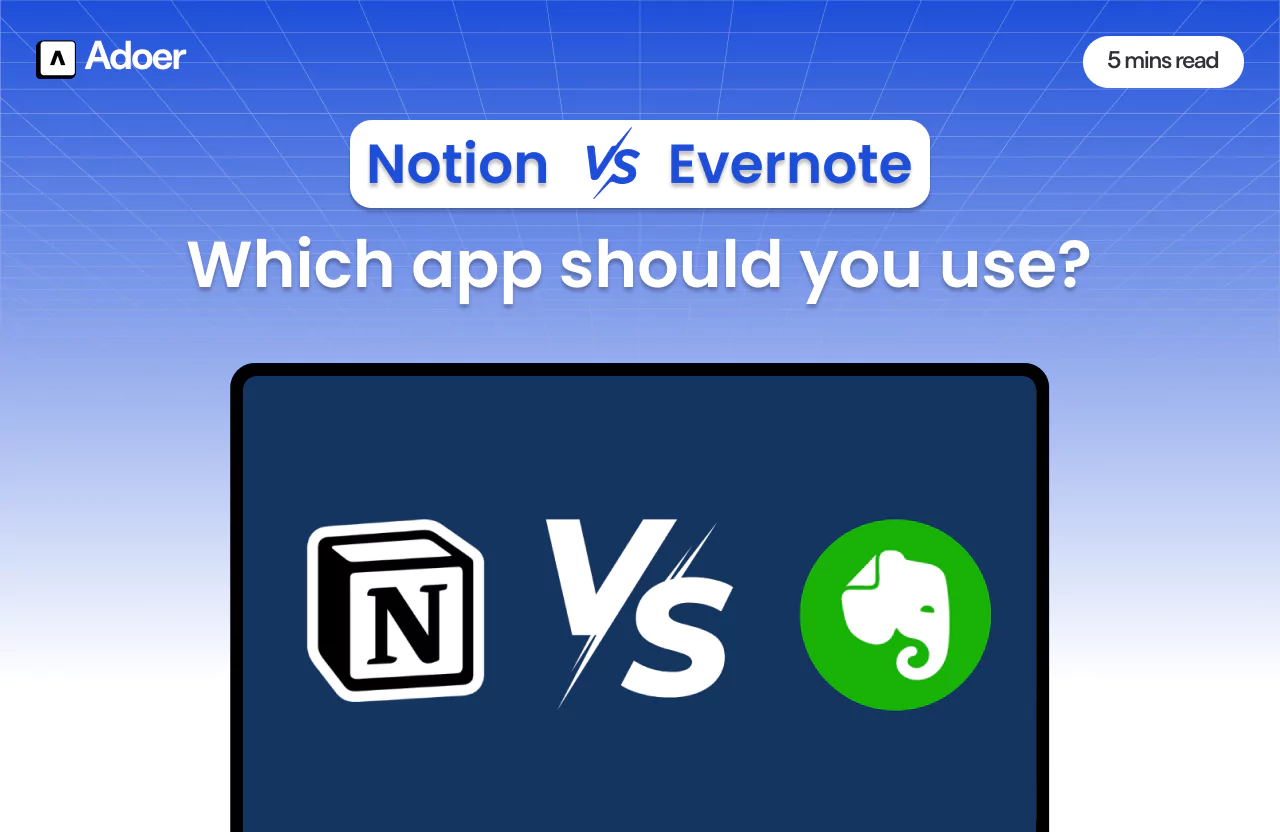Notion vs Evernote: Which app should you use?

Author
Shivang Khungar
Notion vs Evernote is the ultimate battle of productivity giants. These two apps have dominated the space, promising to keep your life in order. But with so many features and complexities, choosing the right one can feel overwhelming.
The Global Productivity apps market size is expected to grow at a staggering rate of 9% from 2024 to 2031. What's even crazier is Evernote alone boasts over 225 million users and Notion is rising rapidly in popularity, particularly among teams and creatives.
Yet, many users express frustration with cluttered interfaces or missing features that don’t match modern workflows.
That’s where Adoer steps in - a smarter, simpler tool designed to address these pain points. This article dives into Notion vs Evernote. Also, we will look at Adoer, comparing its features, pricing, and use cases to help you find your perfect match.
A Quick Overview of Notion vs Evernote, and Adoer
Choosing the right productivity tool depends on your needs. Notion, Evernote, and Adoer each cater to unique user preferences. While Notion vs Evernote has earned massive followings over the years, Adoer is a rising star built for modern workflows.
What is Notion?
In the Notion vs Evernote debate, Notion is a versatile workspace that combines note-taking, databases, and project management into one tool. It’s highly customizable. As a result, it allows users to build task boards, content calendars, or even team wikis.
Ideal for teams, Notion excels in creating interconnected pages and organizing complex information. Its interface is visually appealing but can feel overwhelming for new users.
With built-in integrations and templates, Notion is a go-to for professionals who thrive on flexibility.
What is Evernote?
When it comes to Notion vs Evernote, Evernote is a powerhouse for personal note-taking. It specializes in capturing ideas, organizing notebooks, and syncing notes across devices.
Furthermore, the app supports diverse content types, from simple text to web clippings and scanned documents. Its tagging system makes finding information easy, but some features need to be updated compared to modern apps.
Despite the competition, Evernote remains a favourite for individual productivity.
What is Adoer?
Between Notion vs Evernote, there is Adoer. Adoer redefines productivity by focusing on:
Simplicity and
Efficiency.
It combines calendar syncing, task planning, and motivational tools into a single platform.
The app provides a focus timer, an adaptive UI for different times of day, and an intuitive design. Moreover, Adoer addresses the pain points of cluttered interfaces, making it perfect for both individuals and teams.
Feature Comparison: Notion vs Evernote and Adoer
For users exploring Notion vs Evernote, understanding the strengths is key to deciding which one suits your needs.
Notion’s Key Features:
Flexible Workspaces: Create pages, boards, and interconnected databases for seamless organization.
Team Collaboration: Assign tasks, track progress, and maintain visibility over complex projects.
Template Library: Start projects faster with pre-designed templates for various industries.
Evernote’s Key Features:
Powerful Search: Find notes quickly using keywords, tags, and saved searches.
Content Capture: Save web articles, PDFs, and audio files in one place for future reference.
Cross-Device Sync: Access your notes anytime, whether on a smartphone or computer. This makes it superior in the discussion of Notion vs Evernote.
Adoer’s Key Features:
Focus Timer: Boost productivity with time-blocking and focus-oriented tools.
Motivational Tools: Stay inspired with quotes and visual representations of daily bandwidth.
Simple UI: Moreover, enjoy a clutter-free experience tailored for both personal and team productivity.
Each tool shines in its own way, but Adoer’s modern features stand out for today’s productivity demands.

Pricing: Which Tool Offers the Most Value?
When comparing Notion vs Evernote, pricing plays a significant role in the decision-making process. Both tools provide robust features, but affordability and value differ.
Notion
A standout feature in the Notion vs Evernote comparison is Notion’s pricing. It has a free plan that is ideal for personal use, with unlimited pages and blocks. Its premium plans start at $10 per month, focusing on advanced collaboration and team management.
However, many users find themselves paying extra for integrations, making it less budget-friendly in the long run.
Evernote
Evernote, on the other hand, limits its free tier to 60 MB uploads monthly, which can feel restrictive. Paid options start at $10.83 per month, unlocking more storage, device syncing, and advanced search. Yet, users often question if the features justify the price, especially for casual use.
Adoer
Apart from the Notion vs Evernote debate, here’s where Adoer changes the game. With a freemium model, Adoer lets you enjoy essential productivity features without paying a dime. Whether you need:
Task planning,
A focus timer, or
Motivational quotes are all included.
Upgrading unlocks advanced options like daily bandwidth analysis, audio notes, and future features like link and document saving.
Unlike the subscription-heavy models of its competitors, Adoer balances affordability with meaningful tools. As a result, this value makes it a standout for users looking to streamline without overspending.
Pros and Cons of Notion vs Evernote, and Adoer
Choosing the right app boils down to understanding its strengths and limitations. Let’s break down Notion vs Evernote alongside Adoer.
Notion Pros and Cons:
The notion is a powerful productivity app with unmatched flexibility, but it’s not without its challenges.
Pros:
Versatile for team collaboration and personal projects.
Integrates well with other apps.
Customizable templates and databases simplify task management.
Cons:
Steep learning curve for beginners.
Can feel overwhelming due to its sheer number of features.
Limited offline functionality compared to competitors.
Evernote Pros and Cons:
A key point in the Notion vs Evernote comparison is Evernote’s note-taking feature. Evernote has long been a go-to tool for note-taking, but its pricing and usability spark mixed reviews.
Pros:
Advanced search options make finding notes easy.
Great for personal use, especially note-taking.
Offers audio recording and document scanning.
Cons:
The free tier is highly restrictive.
Pricing plans can seem excessive for casual users.
UI feels outdated for many users compared to modern apps.
Related: Here is the list of best note-taking apps for iPad in 2025.
Adoer Pros and Cons:
Adoer takes a fresh approach to productivity, addressing key user frustrations with its intuitive design and unique features.
Pros:
Minimalistic interface for intuitive navigation.
The freemium model caters to a wide range of users.
Adaptive UI to match the environment.
Lastly, features like Focus Timer and motivational quotes enhance productivity.
Cons:
Currently lacks offline access.
Some advanced features, like document saving, are still in development.
By weighing these pros and cons, you’ll gain clarity about the Notion vs Evernote comparison.

Best Use Cases for Notion vs Evernote, and Adoer
Choosing the right daily planner depends on your needs. Whether you’re managing projects, taking notes, or seeking an all-in-one solution, the right tool makes all the difference. Let’s explore how Notion vs Evernote, and Adoer excel in different areas.
Notion: Best for Teams and Project Management
Notion thrives in collaborative environments where project management and organization are key.
Teams use Notion to create workspaces that consolidate everything in one place. Tasks, project roadmaps, and databases are easily customizable. Moreover, it’s ideal for managing complex workflows while maintaining flexibility.
Its strength lies in its versatility. For example:
Teams can design templates for recurring processes like onboarding or weekly reports.
However, the learning curve can be steep for beginners, which allows Notion alternatives to take the lead.
Evernote: Best for Personal Note-Taking
For students weighing Notion vs Evernote, Evernote can be a better option. If jotting down thoughts quickly is your priority, Evernote might be your best choice.
Evernote shines in personal organization. Thus, allowing users to:
Store notes,
Images, and
Web clippings effortlessly.
Students and writers love its easy search and tag functions for locating content.
Additionally, one of its most loved features is handwriting recognition. This makes storing and searching handwritten notes a breeze. However, its limited collaboration options may leave team users wanting more.
Adoer: Best for All-In-One Productivity
Between Notion vs Evernote, Adoer is a game-changer for those seeking simplicity without sacrificing power.
It seamlessly combines task planning, calendar syncing, and focus timers. Unlike Notion or Evernote, Adoer provides some of the only features such as:
Motivational quotes,
Unique day-parting UI that adapts to your schedule, and
Visual bandwidth indicators
Perfect for individuals and teams, Adoer balances intuitive design with robust features.
Why Choose Adoer Over Notion vs Evernote Debate?
While Notion and Evernote are strong contenders, Adoer goes beyond their limitations. Here’s why Adoer stands out in the productivity game.
Addresses Common Limitations of Notion vs Evernote
The notion can feel overwhelming due to its endless customization options.
Evernote’s cluttered interface often frustrates users who need streamlined functionality. Adoer solves these issues with its minimalistic design and intuitive navigation.
With Adoer, there’s no steep learning curve. The platform is designed for immediate use, saving you time.
Features Tailored for Modern Productivity Needs
The Notion vs Evernote debate does not take into account modern features. Modern users demand more from their productivity tools. Adoer meets these demands head-on.
It combines essentials like task planning with extras such as motivational quotes and visual bandwidth indicators.
Additionally, features, like saving links and audio notes, further enhance its usability for all types of users.
Designed for Both Individuals and Teams
Lastly, Adoer caters to both personal and professional productivity.
Unlike Evernote, which focuses on individuals, and Notion, which leans toward teams, Adoer strikes the perfect balance. Its seamless UI and flexible features work equally well for personal goals or team collaboration.
Moreover, for users tired of compromises, Adoer’s all-in-one design offers a refreshing alternative.
Conclusion: The Notion vs Evernote debate
In the debate of Notion vs Evernote, both have proven their worth, but Adoer redefines productivity with simplicity and innovation. While Notion excels in project management and Evernote is ideal for note-taking, Adoer’s all-in-one design bridges the gap between personal and team needs.
Its minimalistic interface, unique features, and forward-thinking enhancements make it more than just a productivity tool - it’s a smarter way to work.
So, whether you’re an individual chasing goals or a team managing projects, Adoer is the future of organized living.
FAQs about Notion vs Evernote
1. What’s the primary difference between Notion vs Evernote?
The notion is highly customizable for team collaboration, while Evernote focuses on personal note-taking and organization.
2. Are there any free versions of these tools?
Yes, all three apps—Notion, Evernote, and Adoer—offer free plans with limited features to get started.
3. How secure is my data on these productivity apps?
All three platforms use industry-standard encryption, but it’s always a good idea to read their data policies.
4. Can I use these tools on multiple devices simultaneously?
Yes, Notion, Evernote, and Adoer support multi-device sync, so you can access your data anytime, anywhere.
5. Do these apps work well for students?
Absolutely. Notion is great for organizing study projects, Evernote is excellent for note storage, and Adoer helps manage tasks and deadlines seamlessly.


